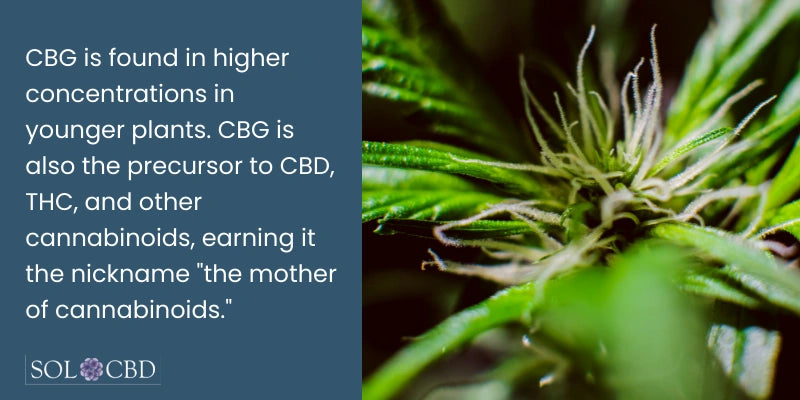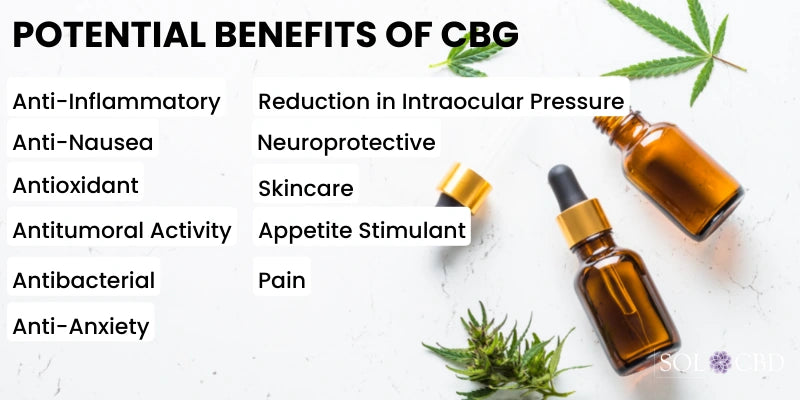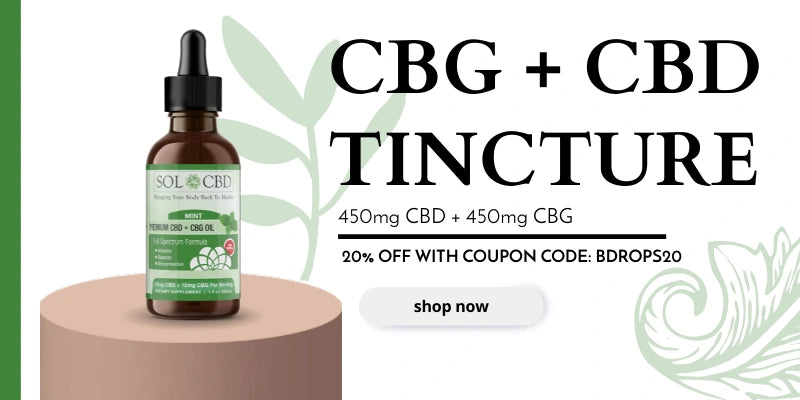Looking for a comprehensive guide on CBG (Cannabigerol)? You've hit the jackpot. This article is your one-stop shop for understanding the intricacies of CBG, its potential benefits, how it stands apart from CBD, and why incorporating CBG into your wellness routine could be a game-changer. Let's dive right in.
Table of Contents
- What Is Cannabigerol(CBG)?
- What's The Difference Between CBD and CBG?
- Where Is CBG Found in the Cannabis Plant?
- How Does CBG Interact with the Endocannabinoid System?
- A Comprehensive Look at the Potential Benefits of CBG
- What are the Benefits of Using CBG and CBD Together?
- Taking CBG: Dosage and Considerations
- Summary
- FAQ's
What Is Cannabigerol(CBG)?
Cannabigerol (CBG) is a lesser-known cannabinoid found in the cannabis plant, often referred to as the "mother of cannabinoids." It serves as a precursor to other cannabinoids like CBD and THC, which means it's one of the first cannabinoids to form as the cannabis plant grows. Unlike THC, CBG is non-psychoactive, meaning it won't give you that "high" feeling commonly associated with cannabis.
Although it's typically present in lower concentrations compared to its more famous siblings, CBD and THC, CBG has been gaining attention for its own set of potential benefits.
What's The Difference Between CBD and CBG?
CBD (Cannabidiol) and CBG (Cannabigerol) are both cannabinoids found in the cannabis plant, but they differ in several key ways. First off, CBD is more abundant in mature cannabis plants, while CBG is found in higher concentrations in younger plants. CBG is also the precursor to CBD, THC, and other cannabinoids, earning it the nickname "the mother of cannabinoids." Both are non-psychoactive, meaning they won't get you high, but they interact with the endocannabinoid system in slightly different manners.
The potential benefits of both are also different, although some overlap exists. CBD has been more extensively researched and is known for its potential to manage issues like anxiety, pain, and seizures. CBG, on the other hand, is less studied but has shown promise in areas like anti-inflammation, antioxidant activity, and possibly reducing intraocular pressure. It's worth mentioning that combining them could offer complementary effects, although this area is still under research.

Related: A Comprehensive Guide To Cannabigerol (CBG)
Where Is CBG Found in the Cannabis Plant?
Unlike its more popular cousins CBD and THC, CBG is typically found in lower concentrations in the cannabis plant, often less than 1%. However, younger cannabis plants tend to have higher concentrations, and breeders are now focusing on strains that are rich in CBG.
How Does CBG Interact with the Endocannabinoid System?
CBG interacts with the endocannabinoid system by binding to cannabinoid receptors, much like CBD and THC. However, the effects of CBG seem to be different and may offer complimentary benefits when taken alongside CBD.
A Comprehensive Look at the Potential Benefits of CBG
CBG is on the rise for a good reason—early research shows promise in a range of areas:
CBG's Anti-Inflammatory Effects
CBG has been studied for its potential anti-inflammatory properties, and the preliminary results are promising. For example, a study conducted on animal models of inflammatory bowel disease indicated that CBG could reduce inflammation effectively. The study suggested that CBG may modulate several inflammatory pathways, thus making it a candidate for potential anti-inflammatory treatments. However, it's super important to note that these studies are still in their infancy and haven't been fully validated in human trials [1].
CBG's Antioxidant Effects
While CBG's antioxidant properties haven't been as extensively studied as its anti-inflammatory effects, there's enough preliminary evidence to keep researchers intrigued. Antioxidants are like the body's security team, combating free radicals that can cause oxidative stress and cellular damage. Early indications suggest that CBG can act as a scavenger for these free radicals, thereby displaying antioxidant properties [2].
CBG and Antitumoral Activity
First things first—what do we mean by "antitumoral"? Essentially, we're talking about any substance that could potentially inhibit or slow down the growth of tumors. So, a compound with antitumoral properties could potentially be a big deal in the realm of cancer research.
Some initial lab-based studies suggest that CBG may have antitumoral properties [3]. These studies have primarily been conducted in vitro (in a petri dish) or in animal models. For instance, research has indicated that CBG could inhibit the growth of certain cancer cells, such as colorectal cancer cells. The mechanism of action appears to involve the disruption of several cellular pathways involved in tumor growth.
You might be wondering how CBG's antitumoral potential compares to other cannabinoids like CBD and THC. The truth is, each cannabinoid appears to interact with different receptors and pathways in the body, which means they may offer varied therapeutic potentials. So, CBG could offer unique benefits when it comes to antitumoral activity, but the jury is still out, awaiting more comprehensive research.
The Neuroprotective Potential of CBG
Neuroprotection refers to the preservation of the structure and function of neurons, which are the nerve cells that make up the brain and the nervous system. So when we talk about a substance having "neuroprotective effects," we mean that it might help shield these cells from damage or degeneration.
Preliminary studies have pointed toward the potential for CBG to be neuroprotective [4]. One study, for instance, explored the effects of CBG on models of Huntington's disease and found some promising results. According to the study, CBG was effective in improving some of the markers commonly associated with this neurodegenerative disease [5].
You may be wondering how CBG's neuroprotective potential compares to other cannabinoids like CBD. Well, CBG appears to interact with different receptors and systems in the body, suggesting that it may offer distinct therapeutic potentials. For instance, CBG seems to have an affinity for certain receptors that are implicated in neuroprotection, which is a focus of ongoing research.
While these early findings are encouraging, it's crucial to emphasize that more research is needed. The studies done so far are usually lab or animal studies and have yet to be replicated in comprehensive human clinical trials. So, if you're considering CBG for its neuroprotective effects, always consult a healthcare provider for the most current and personalized advice.
Related: CBG Oil Benefits For Sleep Disorders
The Anti-Anxiety Potential of CBG
Anxiety can manifest in various forms and levels, from mild apprehensions to full-blown panic attacks. Because it's a complex emotional state, targeting it from a medical perspective often involves multiple approaches, including medication, therapy, and lifestyle changes.
CBG is starting to gain some attention for its potential anti-anxiety properties. While the research isn't as extensive as it is for CBD, some early studies suggest that CBG could have calming effects on the nervous system [6]. Specifically, CBG is thought to interact with certain neurotransmitters in the brain that regulate mood and stress response, though the exact mechanisms are still under exploration.
CBG shares some similarities with CBD—both are non-psychoactive cannabinoids. However, CBG interacts with the endocannabinoid system a bit differently, potentially offering unique benefits. The hope is that CBG could provide a non-psychoactive option for managing anxiety symptoms, making it a subject of keen interest for ongoing research.
Anti-Nausea Effects
While research on CBG and its potential anti-nausea effects is still sparse, some studies have provided preliminary insights. Researchers suggest that CBG could interact with specific receptors in the body that play a role in nausea and vomiting. However, it's important to underscore that this is early-stage research and far from conclusive [7].
Some of the research on anti-nausea effects has focused not just on CBG alone, but also in combination with other cannabinoids like CBD and THC. The interplay between these various cannabinoids could potentially amplify the benefits, but again, much more research is needed to substantiate these initial findings.
Reduction in Intraocular Pressure (IOP)
Intraocular pressure is the fluid pressure within the eye. High IOP is often associated with conditions like glaucoma, which can lead to vision loss if not managed effectively. Traditional medications and surgical options are available, but researchers are always looking for alternative treatments.
CBG has been studied for its potential impact on IOP. Preliminary findings suggest that CBG could help reduce intraocular pressure, possibly through its interaction with specific receptors in the eye. These studies mainly involve animal models, but they're a stepping stone to understanding the potential application of CBG for humans [8].
What sets CBG apart from its more famous sibling, CBD? Well, the two cannabinoids share similarities but may interact differently with the endocannabinoid system, possibly affecting IOP in distinct ways. This makes CBG a candidate for further research, especially as a complementary treatment.
Effects on Skin
Some initial studies hint at the potential benefits of CBG for various skin conditions. For example, early research has shown CBG's effectiveness in reducing inflammation [10].
What's more, CBG has demonstrated antimicrobial and antibacterial properties in lab settings. These traits could make CBG an intriguing option for treating skin conditions related to bacteria, such as acne.
Compared to traditional skin treatments, CBG acts through the endocannabinoid system, which has a role in regulating skin functions like sebum production and inflammation. This unique mechanism opens up a whole new avenue for skincare research.
Here's where it gets exciting. CBG might offer synergistic effects when used with other cannabinoids or traditional skincare products. Early studies are looking into these combinations, offering a glimpse into the future of holistic skincare.

Other Potential Benefits
Before we dive into some of the other potential benefits of CBG, remember, that none of this is medical advice, and more research is needed to back up these potential benefits. Got it? Let's go!
- Antibacterial Powers - Yes, you read that right. Some early studies are showing that CBG might have antibacterial properties. It could potentially serve as an antibacterial agent against drug-resistant MRSA microbial strains that are unresponsive to traditional drug treatments [11].
- Pain Management - Researchers are excited about CBG's prospects in pain management. Its unique way of interacting with the body's endocannabinoid system makes it a subject of interest in this field [1].
- Promising Antidepressant Qualities - Early research indicates that CBG might have mood-enhancing effects, which could make it a candidate for further research into treating depression or anxiety disorders.
- Appetite Stimulant - Here's an intriguing one: CBG might help you munch. Unlike CBD, which doesn't significantly affect appetite, early studies suggest that CBG may actually stimulate it [12], making it a subject for further study in conditions like cachexia (wasting syndrome).
The world of CBG research is like the Wild West: a vast landscape full of untapped opportunities but also risks. It's an exciting time to keep an eye on this cannabinoid as more studies emerge.
So, there's your roundup of other potential benefits of CBG that researchers are buzzing about. Keep an eye on this space; it's one to watch! 😊
What are the Benefits of Using CBG and CBD Together?
Using CBD oil and CBG oil together could offer a synergistic effect known as the "entourage effect" although the scientific support for this concept is still somewhat limited. Basically, the entourage effect suggests that cannabinoids and terpenes can work better together than they do individually. Let's look at some of their potential benefits when used together:
Enhanced Anti-Inflammatory and Antioxidant Properties
Using CBD and CBG together could potentially amplify their individual anti-inflammatory and antioxidant activities. This could be especially beneficial for conditions like chronic inflammation or oxidative stress, though it's important to note that more research is needed to validate this effect.
Related: The Benefits Of CBD Entourage Effect
Broad-Spectrum Effects
CBD has been extensively studied for a range of effects, from neuroprotection to antianxiety properties. On the other hand, CBG has shown promise in areas like intraocular pressure reduction and antitumoral activity. When used together, they may provide a broader spectrum of potential benefits.
Potential for Improved Mood and Reduced Anxiety
Both CBD and CBG have shown some promise in early studies for reducing anxiety and improving mood. When taken together, they might work synergistically to enhance these effects.
Enhanced Bioavailability
Taking CBD and CBG together could potentially improve the bioavailability of both cannabinoids. While this concept needs more scientific backing, the idea is that the presence of multiple cannabinoids could make it easier for the body to absorb and utilize them.
Versatility in Addressing Various Conditions
Since CBD and CBG have been studied for their effects on a diverse range of conditions—from neurodegenerative diseases to skin conditions—combining them could offer a more versatile approach to wellness. It's a way to cover more ground in terms of potential benefits.
Balanced Side Effects
Each cannabinoid comes with its own set of potential side effects. Combining them might help balance these out, though it's always good to consult with a healthcare provider to tailor the combination to your specific needs.
Bottom Line
Using CBD and CBG together could offer a range of potential benefits due to their individual properties and the proposed entourage effect. However, as always, more research is needed to substantiate these potential benefits. If you're considering adding them to your wellness routine, it's wise to consult a healthcare provider for personalized guidance.
Related: Embracing Purity: The Advantages And Implications Of Using USDA Organic CBD
Taking CBG: Dosage and Considerations
Determining the appropriate dosage for CBG can be a bit of a moving target, mainly because research is still in its infancy. As with many supplements, the right dosage for you may vary based on several factors including your age, weight, metabolism, and the reason you're considering using CBG. There is currently no standardized dosage guideline, making it even more important to consult a healthcare provider for personalized advice tailored to your individual needs.
When starting out with CBG, many people opt for the "start low and go slow" approach. This means beginning with a low dose and gradually increasing it while monitoring how your body reacts. It's also worth noting that CBG might interact with medications you are currently taking or have an impact on medical conditions you may have, so medical consultation is key. As always, make sure to read the label on any CBG product you're considering, as the concentration of CBG can vary from product to product.

Summary
- CBG is a minor cannabinoid found in the cannabis plant and is considered non-psychoactive.
- Early research suggests CBG may have potential therapeutic benefits, particularly for conditions like inflammation.
- Different forms of CBG products are available, including oils.
- Much more research is needed to confirm the safety and efficacy of CBG.
CBG, though a minor player in the cannabis scene, is starting to steal some of the spotlight. As research continues to unfold, we'll undoubtedly learn more about this fascinating cannabinoid and its potential place in the wellness arena.
FAQ's
What is CBG and How is it Derived?
CBG stands for cannabigerol, and it's a minor cannabinoid found in cannabis plants. CBG is derived from the acidic form of cannabigerolic acid (CBGA), which is considered the "mother" of other cannabinoids like THC and CBD.
What Are the Uses and Benefits of CBG?
The uses and benefits of CBG are still being explored. However, early research on CBG is still in its infancy but has suggested that CBG may act as an anti-inflammatory, neuroprotective, and even an antibacterial agent. It's important to note that these potential health and wellness benefits are not fully validated yet.
How Does CBG Differ from CBD and THC?
CBG is considered a non-psychoactive cannabinoid, much like CBD. This means it won't give you the "high" that you get from the effects of THC. CBG vs CBD is an interesting area of study, as they both interact differently with the endocannabinoid system.
What Are the Side Effects of CBG?
Side effects of CBG are not yet well-documented since research on CBG is still in the early stages. However, high doses of CBG could potentially lead to mild side effects, so it's always a good idea to consult a healthcare provider.
Does CBG Affect Young Cannabis Plants Differently?
CBG is present in higher concentrations in young cannabis plants compared to CBD and THC. As the plant matures, CBG is converted to other cannabinoids, reducing its concentration.
Is CBG Effective Against Bacterial Infections?
Some early research found that CBG was effective against methicillin-resistant Staphylococcus aureus (MRSA), a type of staph infection that is resistant to several antibiotics [13].
Can I Find Products Combining CBD and CBG?
Absolutely, there are products on the market that combine the benefits of CBD and CBG, aiming to offer complementary effects for health and wellness. Please note that these products are not intended to treat, cure, or prevent any disease.
How Do I Determine the Right Dose of CBG?
Determining the right doses of CBG can be tricky as it depends on several factors like age, health condition, and individual needs. It's best to consult with a healthcare provider for personalized advice.
What Are Some Other Potential Benefits and Uses of CBG?
Beyond the more commonly discussed benefits, CBG has been shown to have potential in other areas like skin health, anti-nausea effects, and even as an antioxidant. Again, more research is needed to validate these potential uses.
What's the Legal Status of CBG?
Since CBG is derived from hemp, it is generally considered legal in places where hemp is legal, but always check your local laws to be sure.
Sources:
- https://www.ncbi.nlm.nih.gov/pmc/articles/PMC8467477/
- https://www.sciencedirect.com/science/article/pii/S0367326X21000903
- https://www.ncbi.nlm.nih.gov/pmc/articles/PMC7914500/
- https://www.ncbi.nlm.nih.gov/pmc/articles/PMC7279038/
- https://www.ncbi.nlm.nih.gov/pmc/articles/PMC4322067/
- https://doi.org/10.2174/1570159X17666190903103923
- https://www.ncbi.nlm.nih.gov/pmc/articles/PMC3883513/
- https://pubmed.ncbi.nlm.nih.gov/6499952/
- https://www.ncbi.nlm.nih.gov/pmc/articles/PMC8878527/
- https://www.ncbi.nlm.nih.gov/pmc/articles/PMC8778347/
- https://pubmed.ncbi.nlm.nih.gov/18681481/
- https://www.ncbi.nlm.nih.gov/pmc/articles/PMC5021742/
- https://www.ncbi.nlm.nih.gov/pmc/articles/PMC7345649/
Remember, this is an evolving field, and it's crucial to consult a healthcare provider for personalized medical advice.





























